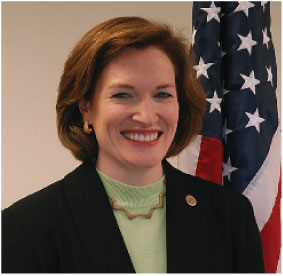In a career filled with what she calls "leaps of faith," Elizabeth Brownlee Kolmstetter (M.A. psychology '87; Ph.D. '91) took her biggest leap yet in 2002, when she agreed to shoulder the responsibility of a Congressional mandate to hire and train a federalized workforce of 55,000 airport security screeners nationwide--within less than a year. Kolmstetter, who is an industrial/organizational (I/O) psychologist, says that in her wildest dreams, she never expected to find herself on the frontline of homeland security. Her initial career goal was simply to improve people's work environments. "I/O psychology is a broad range of areas about people and work," she explains. "Industrial psychology tends to use formal systems to match the right people with the work requirements."
"Originally, I actually was supposed to be at the World Trade Center on Sept. 11, running a workshop," she recalls. "Something--fate or whatever--led me to change the workshop to the previous week, and I left the center a couple of days before Sept. 11." She was at work in her office three blocks from the White House when the events of that day began to unfold. "Seeing the Pentagon on fire and being evacuated--it was just horrific, and the most scary moment of my life." That experience--and knowing what could have happened--left a strong impression on Kolmstetter. "I'm in government service because I believe in serving the American people. So, like many people after Sept. 11, I asked what I could do to make sure it never happened again." Three days later, she wrote a white paper for the NSSB to submit to Congress, detailing how the organization could help with creating the new aviation security screener workforce. That paper led to her involvement in Congress' Aviation and Transportation Security Act, which was signed into law on Nov. 19, 2001. The act authorized a new federal agency, the Transportation Security Administration (TSA), with the mandate that security at 450 U.S. airports be federalized within the next year--a goal considered by many to be impossible. It would be Kolmstetter's responsibility to define new standards for airport screeners and then to recruit, hire, and train tens of thousands of them in mere months. Although it was her biggest leap of faith yet, she remained undaunted. "From the beginning, we said, 'Check your egos at the door--we need a team that's going to do whatever it takes.' It was a 24-7 operation, and what made it work was the people," Kolmstetter says. "Companies were offering executives to come and help us. It was amazing to watch these people come together and respond to the need of their country." The conditions were unprecedented. The team, working for a new agency that had no real structure in place, faced an incredible amount of urgency to restore the country's faith in air travel. "We knew that it was affecting the economy and industry," Kolmstetter says. "We honestly just ran on adrenaline and passion for a year." That energy made the impossible happen--the TSA established an exacting set of standards for airport security screeners and hired 55,000 of them before the year was out. "I watched a miracle unfold," Kolmstetter says. "It's incredible what people can accomplish when everyone has the same goal: to never let something happen again like it did on Sept. 11." Within that year, Kolmstetter left the NSSB to work for the TSA full-time and now serves as its deputy assistant administrator for workforce performance and training. Today, she says, not only are the skies safer, but the public seems to be more comfortable about flying. "Projections had been that the level of air traffic wouldn't rise to pre-Sept. 11 numbers until 2006. Well, guess what? This summer, the level exceeded those numbers." The airport screeners have also proven themselves, confiscating approximately 11.2 million prohibited items in the program's first two years. Still, Kolmstetter adds, "We continuously try to improve. No human or technology can get 100 percent of everything at a checkpoint, and that's why we have created what we call 'rings of security,' which are additional security measures, such as federal air marshals, hardened cockpit doors, and pilots who have volunteered to carry arms in the cockpit." Kolmstetter also developed the fitness-for-duty standards and training standards program for these pilots who, she says, number in the thousands. Kolmstetter takes great pride in her work with the TSA but concedes that the amount of scrutiny placed on the agency is difficult. It particularly bothers her when there are complaints about airport security screeners. "No one understands that every day, the screeners have to put their hands in bags that might have bombs in them and deal with a public that isn't always patient. I don't understand why anyone would put down this workforce," she says with some frustration. "They are there every day with a mission in their minds and hearts of what they are doing for homeland security. They're our frontline in the war on terrorism." Her zeal for her work with the TSA is palpable, but Kolmstetter's first priority is her family, which includes her husband, Michael, and their five-year-old twins. "My family is my strength. I do strive hard to balance work and family. But my kids make it all worthwhile--I do what I do because I want them to grow up in a strong and safe country." Making a difference--whether to homeland security or to someone's life--is what drives this hard-working alumna. "We have such a short opportunity to make a difference," she says. "If people have a talent and passion and can use it to make a difference, what more can they ask for?" |
